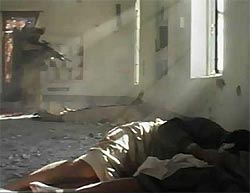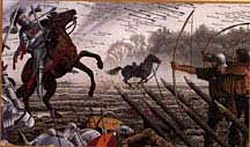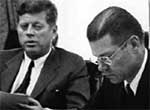Not Every Picture Tells a Story
This is a slightly modified version of the editorial published in The New York Times, November 20, 2004.All of life seems to be about denial — the denial of death, the denial of reality, the denial of everything that it is convenient for us to deny. Photography because of its causal relationship to the world seems to give us the truth or something close to the truth. I am skeptical about this for many reasons. But even if photography doesn't give us truth on a silver-platter, it can make it harder for us to deny reality. It puts a leash on fantasy, confabulation and self-deception. It provides constraints, borders. It circumscribes our ability to lie — to ourselves and to others.
 We can imagine, in the privacy of our thoughts, that war is war is heroic and honorable — even noble. Photography can make it difficult for us to maintain these illusions. Take the recent videotape of the Iraqi insurgent in Falluja being shot and killed by a U.S. Marine. It does not tell us everything we need to know about what happened. It does not tell us what the Marine was thinking or what his prisoner was thinking — that is, what he was thinking before he was shot dead. But it does tell us that something happened. And, as a result, it makes the shooting, the killing, itself, much harder to deny.
We can imagine, in the privacy of our thoughts, that war is war is heroic and honorable — even noble. Photography can make it difficult for us to maintain these illusions. Take the recent videotape of the Iraqi insurgent in Falluja being shot and killed by a U.S. Marine. It does not tell us everything we need to know about what happened. It does not tell us what the Marine was thinking or what his prisoner was thinking — that is, what he was thinking before he was shot dead. But it does tell us that something happened. And, as a result, it makes the shooting, the killing, itself, much harder to deny.No doubt, there will be an investigation — an attempt to provide context — to fill in the details. Why was the prisoner being held? Who was he? Who was the Marine who shot him? What were his instructions from his superiors? And many other questions. However, one central questions remains: what are we looking at? And that question will not go away. No more so than the pictures of Abu Ghraib went away. Pictures are physical evidence, and as such, they are part of an attempt to understand what really happened.
Pictures force us to collect our thoughts. They make us think about motivation, intent — they make us think about how we interpret our experiences, how we think about the world, how we try to understand the motives of others. (Maybe it's in our DNA. We look at other people — even pictures of other people — and we want to know: what were they thinking?) And when it's a photograph of a crime or of violence, we think even harder. Such images make us care because they make us part of the mystery of what happened. We are not merely spectators; we are investigators. We are involved. What do the images mean? What do they show? What led up to these events? Are there mitigating circumstances? Is it as bad as it looks?
Pictures provide a point around which other pieces of evidence collect. They are part of, but not a substitute for, an investigation. There are real questions to be answered. That's why we have international law, rules of engagement and codes of military conduct. There is a fact of the matter to be determined. Was this a cold-blooded killing? Was it illegal? Was it a war crime? Who was responsible? Who should be blamed? The Abu Ghraib photographs turned out (following an investigation) to be what they seemed to be — pictures of torture and abuse. They were as bad as they looked (to me) — even worse. Some of the perpetrators were held accountable. But accountability did not proceed very far up the chain of command. (And, of course, there were those who felt that the torture and abuse was justified.)
Unhappily, an unerring fact of human nature is that we habitually reject the evidence of our own senses. If we want to believe something, then we often find a way to do so regardless of evidence to the contrary. Believing is seeing and not the other way around.
For many people the interpretation of this videotape will devolve into general questions about Iraq. People will interpret this videotape according to their ideological dispositions. Are we looking at the face of freedom on the march or the footprint of an out-of-control behemoth leaving a trail of bodies in its wake? For the true believer in the war in Iraq, these images will in all likelihood make little impression. For them, the ends for which this war is being fought justify the means. War is bloody, brutal; the enemy is vicious. But the objective of extending freedom redeems what has to be done to achieve it. In this view the war is unfortunate but necessary. For people, like myself, who are deeply skeptical about this war, it is not clear what the "ends" of this war might be. It doesn't seem like Iraq is freer or will be freer in the near future. Call me a naysayer. Call me a skeptic, but all I am confronted with in the newspapers is evidence of mayhem. And with no end of the war in sight, the terrible means — the manner in which this war is being fought — seem, at best, misguided and at worst, deeply wrong.
 John Keegan, in The Face of Battle, writes about the Battle of Agincourt. Henry V has invaded France out of political ambition. He would like to be more than just King of England. (Shakespeare gives Henry the line: "The signs of war advance, no King of England if not King of France.") At a point of crisis in the battle, Henry orders the killing of his French prisoners. There are too many of them. And if the tide should turn against the English, the French prisoners represent an unacceptable threat. Keegan, in a section entitled, "The Killing of Prisoners," discusses Henry's decision: "Comprehensible in harsh tactical logic; in ethical, practical and human terms, much more difficult to understand."
John Keegan, in The Face of Battle, writes about the Battle of Agincourt. Henry V has invaded France out of political ambition. He would like to be more than just King of England. (Shakespeare gives Henry the line: "The signs of war advance, no King of England if not King of France.") At a point of crisis in the battle, Henry orders the killing of his French prisoners. There are too many of them. And if the tide should turn against the English, the French prisoners represent an unacceptable threat. Keegan, in a section entitled, "The Killing of Prisoners," discusses Henry's decision: "Comprehensible in harsh tactical logic; in ethical, practical and human terms, much more difficult to understand." In many ways we haven't progressed very far in six centuries. Or have we? Article III of the Geneva Convention says, "Persons taking no active part in the hostilities including members of armed forces who have laid down their arms and those placed hors de combat by sickness, wounds, detention or any other cause, shall in all circumstances be treated humanely..." Presumably, shooting an unarmed, wounded prisoner is not an example of humane treatment. And so, I find myself thrown back on my ideological predispositions. I have worried for some time that we are going down a rabbit-hole in Iraq, much like the rabbit-hole we went down in Vietnam. It is a rabbit-hole where no one in power believes they made a mistake and where no one in power wants to find a way out. It's not that Vietnam is Iraq. The geopolitical situations are completely different. And yet, there is a common element — our capacity for self-deception, for denial and for evasion.
Videotape or no videotape, that still remains.
—Cambridge, Massachusetts
November 2004
November 2004







